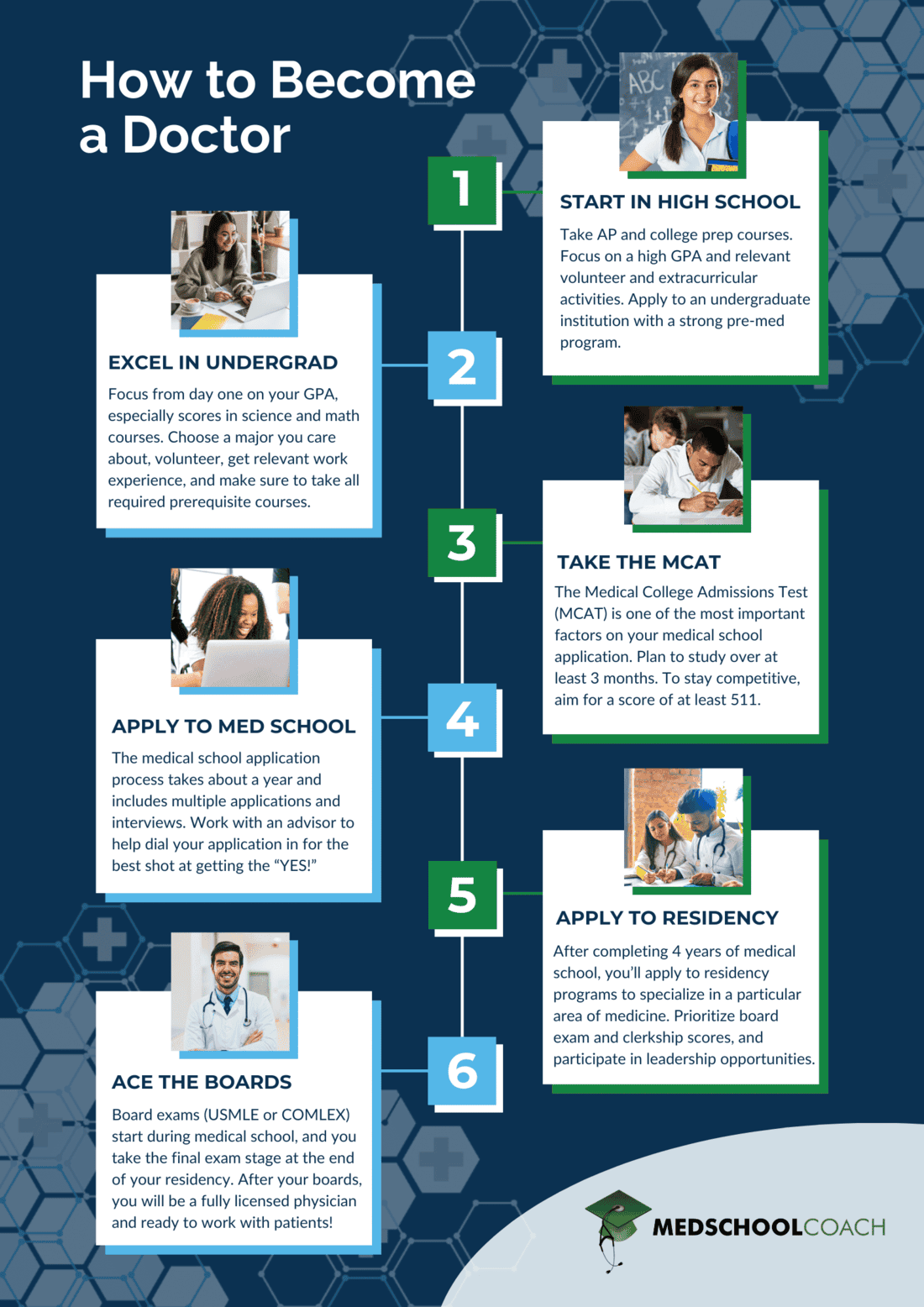Thinking you want to practice medicine? It’s a pretty noble career path — I should know; I’m a practicing medical doctor in Boston. This process can feel a little overwhelming at times, but there’s also nothing quite as exciting as getting a YES! after working for years to optimize your medical school application.
I put together a guide for aspiring doctors, not just on how to become a doctor, but how to prepare yourself for the process and impress medical schools with your prep work. Let’s start!
Can You Answer “YES!” to These Questions?
If so, you’re on the right track.
- Do you have empathy and compassion?
- Do you have strong communication skills?
- Are you resilient and able to manage stress?
- Do you enjoy problem-solving?
- Do you pay attention to details?
- Is teamwork and collaboration gratifying to you?
- Do you have strict ethical standards?
- Are you highly motivated?
- Is studying science enjoyable?
- Do you possess strong leadership skills?
Timeline for Becoming a Doctor
On average, it takes 11-15 years on average to become a fully autonomous physician, including undergrad, medical school (including residency), and a post-bacc in between (if you need one). If you choose not to proceed to residency, you’ll still earn your medical degree in about 8-10 years, but this doesn’t guarantee licensure and the ability to treat patients.
Some accelerated BS/MD programs can streamline this, but there is no “fast” way to become a doctor, even if you start at 30, 40, or older.
Timelines generally look like this:
- Get your undergraduate degree (4 years)
- Do a gap year or pursue a post-bacc (1-2 years)
- Attend medical school (4 years)
- Enter residency (3-7 years)
- Complete a fellowship (optional 1-3 years)
A fellowship is recommended if you intend to pursue a sub-specialty within intended fields like neurology, obstetrics, or psychiatry. MD-PhD programs, which are for people who want a career rich in both extensive research and patient care will extend this timeline further.

How to Become a Doctor in 7 Steps
1. Prepare Early
The road to becoming a doctor is intellectually demanding, but you’ll be off to a good start if you start preparing during high school. Challenge yourself with honors and AP classes. Push yourself in science and math. Consider volunteering in healthcare.
You’ll also need to demonstrate excellent leadership skills as a doctor. Hone those skills by heading clubs and student government. Seek out mentorship opportunities. Show that you can manage your time.
2. Excel in Undergrad
Attending the “best” or “highest ranked” college or university is not a prerequisite for a successful career in medicine. What truly matters is getting good grades and excelling on the Medical College Admission Test (MCAT). This opens the door to medical school.
What to major in to become a doctor as you pursue a bachelor’s degree isn’t the most important decision, either. Medical schools require specific prerequisites but do not favor one major over another. In fact, the humanities major may appear more well-rounded than the organic chemistry student.
3. Work, Volunteer, or Intern in Healthcare
GPA and MCAT scores are important factors when applying to medical school, but exposing yourself to medicine during your undergraduate career is also crucial. Medical schools need to know that you understand the profession you’re pursuing.
Volunteer in a hospital, conduct research with a professor, and pursue shadowing in a healthcare setting. Meet with your pre-med advisor about opportunities available at your respective school to boost your medical school application.
4. Ace the MCAT
To study for the MCAT, create a structured study plan covering each section. Use prep books, full-length practice exams, high-quality Qbanks, and consider investing in 1-on-1 tutoring. Adjust your study plan as needed if you notice weaknesses in one area over another.
A good MCAT score places you at or above the average score at your target medical schools. The average MCAT score for 2023-2024 matriculants (students who applied and were accepted to a medical program) was between 511.7 for MD schools and 503.9 for DO schools. I typically advise students to aim for a 511 or higher to keep their application competitive.
5. Apply to Medical School
Undergraduates who want to matriculate to medical school directly after graduation begin the application process in the spring of their junior year. The entire process takes about a year, so when to apply depends on your timeline — if you plan on taking a gap year, you should apply in the cycle that starts right around your spring graduation date.
There are three main parts to the application process:
- The primary application: This includes general information, letters of recommendation, test scores and GPA, information about your volunteer and work experience, and your personal statement. The personal statement can convey your motivations for joining the medical field and why you’re a good fit for medicine. You’ll also decide at this point which programs you want to apply to.
- The secondary application: Medical programs invite students to complete secondaries if they meet the baseline for entry into their program. You may be asked to write additional essays about challenges you’ve overcome or the state of public health, for example. Make sure what you say here is unique and specific to the institution to which you’re applying.
- The interview: This is your chance to stand out. Follow interview tips like dressing appropriately and expressing your passion for the school where you’re interviewing. Admissions committee members (AdComs) want to understand why you are — or aren’t — a good fit for their program. Most importantly, be yourself.
Note: MD (allopathic) and DO (osteopathic) programs use different application systems (AACOMAS for osteopathic programs and AMCAS for allopathic schools). Many pre-meds apply to both types of programs. It all depends on your individual career goals.
6. Excel During Medical School
The first two years of medical school are mainly devoted to classroom lectures and instruction. In the third year, students begin clinical clerkships (known as clinical rotations) to work directly with doctors and develop the medical knowledge they need to advance their careers.
Prioritize getting enough sleep, exercise, and healthy eating. Develop effective study habits and set realistic goals. Give yourself enough time to prepare for licensure exams like the USMLE (allopathic physicians) or COMLEX (osteopathic physicians). Most students take the first test of these exam series at the end of their second year.
Note: You’ll get your medical degree after completing this program, but to be a fully autonomous doctor and treat patients, you will also need to complete a residency training program and pass all medical licensing examination series.
7. Apply to Residency
At the beginning of your fourth year of medical school, you apply to residency training programs. Interviews follow.
Fourth-year medical students try to match with programs by participating in the National Resident Matching Program (NRMP), an algorithm-based approach to the process. Applicants rank their program preferences, and programs rank their preferred applicants. Based on these preferences, the match system then pairs applicants to programs, and the results are released on Match Day in March.
After you graduate from your residency program, you can receive full board certification in your specified medical specialty.
8. Complete a Fellowship
It’s not required, but many doctors also choose to complete fellowships in a chosen subspecialty of medicine to be an expert in that narrow field. Most fellowships take 2-3 years to complete and may broaden your career options, depending on your performance and goals.
How Much Does It Cost to Become a Doctor?
The costs of becoming a doctor vary greatly depending on factors like location, specialty, and schools attended. Private schools cost more to attend than public schools, for example. Generally, prospective doctors face expenses for:
- Undergraduate tuition and fees
- Textbooks and supplies
- MCAT registration fees and prep materials
- Medical school tuition and fees
- Licensing exams and fees
The total cost can easily exceed hundreds of thousands of dollars. The average cost of medical school in the US in 2024 is just shy of $238,000.
To reduce that burden, many prospective doctors receive a combination of scholarships, grants, and federal and private student loans. Forgiveness programs may also be an option if you are open to working in high-need areas. A few medical schools are totally free, and some students attend medical school at no cost via the military.
Despite the hefty price tag, many aspiring doctors find the investment worthwhile once they are board-certified and start a fulfilling career with the potential for high earnings.
Physician Salary Range
The salary range for physicians in the U.S. varies widely depending on factors like specialty, experience, location, and type of practice. According to the U.S. Bureau of Labor Statistics, the average physician’s salary in the spring of 2023 was $263,840.
Specialists in areas like cardiology, radiology, and dermatology can earn significantly more. From that same data set, average salaries were reported as follows:
- Family Medicine Physicians: $240,790
- Neurologists: $271,470
- Obstetricians and Gynecologists: $278,660
- Emergency Medicine Physicians: $306,640
- Anesthesiologists: $339,470
- Dermatologists: $342,860
- General Surgeons: $348,890
- Radiologists: $353,960
- Cardiologists: $423,250
- Pediatric Surgeons: $449,320
FAQs
➕ What does a doctor do?
Doctors diagnose and treat illnesses, injuries, and medical conditions. They examine patients, order diagnostic tests, interpret results, prescribe medications, and develop treatment plans.
Primary care doctors also provide preventive care and educate patients about health. Depending on their background, they may perform procedures or surgeries or offer specialized services. They collaborate with other healthcare professionals to ensure comprehensive patient care.
➕ What are residency and fellowship training programs?
Residency programs and fellowships provide medical training for doctors after medical school.
Residents work under supervision in hospitals, gaining hands-on experience in their chosen specialty before they are allowed to work independently. A residency can last anywhere from 3 to 7 years, depending on the specialization.
Fellowship programs are optional, specialized training beyond residency that focuses on gaining experience in subspecialties. Mentorship opportunities may also be valuable parts of your medical education.
➕ Which high school courses should I take to become a doctor?
At the high school level, it’s important to develop a strong foundation in sciences like biology, chemistry, and physics. Take AP and honors-level courses if you can. Math courses like algebra and calculus are also beneficial.
It’s also important to go into your undergraduate coursework with a well-rounded education. Seek out classes that develop your critical thinking and communication skills, like psychology and humanities courses.
➕ What should I major in during college to prepare for medical school?
There is no specific major required for medical school. Many students choose a science-related field, such as biology or chemistry, for a stronger foundation in science. Assume most schools will want coursework within the last 5 years of your application.
Each medical school has a series of prerequisites for you to meet that includes coursework in the behavioral sciences, lab sciences (biology, general chemistry, and organic chemistry), physics, biochemistry, and math. Most require at least one writing-heavy course in the humanities or social sciences.
From here, required coursework can vary by medical school program. Some are also more flexible than others in counting AP courses toward those requirements.
➕ Which extracurriculars are best to prepare to become a doctor?
There is no set rule on what kind of extracurriculars you should be a part of as you prepare to become a doctor, but well-rounded experience is important. Medical schools like to see some combination of clinical, volunteering, research, leadership, and shadowing experience. Keep these five categories in mind as you seek out extracurriculars at your institution.
➕ Can I go to medical school if I didn’t do pre-med?
You don’t need to do pre-med programs to apply to medical school as long as you complete the prerequisite coursework and take the MCAT. Some undergrad programs don’t even have tracks for pre-med students.
Medical schools may have additional requirements beyond this to show an ability to handle challenging coursework, but they all consider applicants from any academic background.
➕ Which standardized tests are required for medical school?
The primary standardized test required for medical school admission in the U.S. is the MCAT. Some schools may also require Situational Judgment Tests (SJT) like the Casper or AAMC PREview to evaluate soft skills like communication, self-awareness, and ethics.
Snapshot and Duet are two additional mini-assessments under Casper that evaluate your motivations for entering medicine and how you match with a program, respectively.
➕ How do I choose whether to become an MD or DO?
Choosing between an MD (Doctor of Medicine) and a DO (Doctor of Osteopathic Medicine) depends on your personal preferences and career goals. Both degrees lead to medical practice. DO programs emphasize a somewhat more holistic approach to patient care.
In terms of the application process, both MD and DO programs heavily weigh GPA and MCAT scores. Research both paths, consider their philosophies, and evaluate residency opportunities before deciding.
Comprehensive Medical School Admissions Consulting
The journey to medical school is a long and challenging one that can result in a rewarding career. There’s no reason to feel overwhelmed, though — MedSchoolCoach is here to help. Our Physician Advisors can:
- Walk you through the entire process of becoming a standout applicant to medical school
- Help you access the required extracurricular experiences, choose the right pre-med courses, and hone in on your “Why” for wanting to become a doctor
- Team up with a professional writer to help you optimize your personal statement and application materials
- Conduct mock interviews with you so that you impress AdComs when it’s time for the real thing.
Learn more about 1-on-1 admissions advising and how it can boost your medical school prospects.
Ready to get started? Schedule a free 15-minute consultation with MedSchoolCoach, and we’ll help you get there, no matter where you are in the journey.



